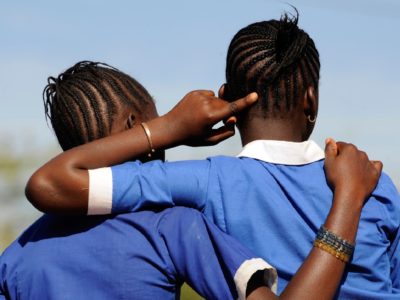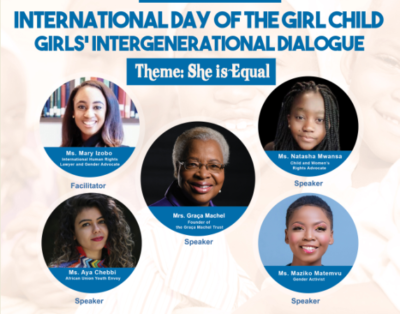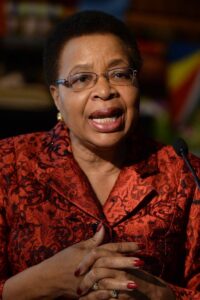One in every four adolescent girls in the world lives in Sub-Saharan Africa. If well nurtured, they will be integral in Africa’s social transformation and economic development. In the last few months, Mrs. Graça Machel has focused on developing a movement focused on nurturing African adolescent girls’ innate power.

Photo credit: Annie-Spratt
The movement began with two separate webinars, both driven by adolescent girls from across the African continent. The first webinar, a collaboration between The Trust’s Child Rights Programme and The Amazon Leadership (ALI) Initiative, commemorated the 2020 International Day of the Girl Child through an Intergenerational dialogue which with girls’ representatives from five regions in Africa (Central, West, North, East, and Southern Africa). The panel shared their concerns and challenges to inform and influence girls’ advocacy agenda within the African continent.

Recommendations from the girls, which will inform GMT’s advocacy agenda for girls in 2021, included:
- Governments need to place Girl’s education as an urgent strategic development priority. This will no doubt lead to healthier and more empowered women who positively contribute towards the economy;
- Begin community dialogues on the importance of dismantling racial systems which prevent girls in the Diaspora from enjoying the same benefits as other girls.
- Women and girls must challenge our patriarchal societies and demand recognition as equal citizens. #SheIsEqual.
- Recommendation on the establishment of a Pan-African Girls Movement Reference Group led by women and girls. The movement aims to create a platform where women and girls between the ages of 10 – 18 years can spotlight their real-lived realities on the African Continent.
“It is powerful when we find our voices as girls and we step into our power and we change the narrative, discriminatory laws and culture. With that power we can enforce protection for girls’ dignity. We should focus on turning our powerful voices into political and social change and to continue to build our movement. That movement should be two things, Pan-African and inter-generational to move forward to a future that is equal,” said Aya Chebbi, one of the young women on the panel and a Pan-African activist, Tunisian diplomat and feminist.
The second webinar titled the Graça Machel Trust Adolescent Girls African Listening Series focused on real-time stories from adolescent girls on how the pandemic affected them and a call to action for stakeholders doing work on empowering the girl child in Africa. Among the issues that came up was the added caregiver burden, being out of school, feeling disconnected from friends and family, struggling with the inequities caused by the digital divide, and physical abuse and mental health challenges.

GMT Founder Mrs Graça Machel.
“We recognize the inherent vibrancy, creativity, and energy adolescents possess. We aim to catalyze the unleashing of this strength so adolescents can exercise full agency over their lives, challenge and break through the social norms that constrict them and in doing so, grow into a new generation of women,” said Mrs. Machel in a recent event. The adolescent girls’ movement will continue to address the societal barriers that impede adolescents’ holistic socio-economic development and transform society.










 The Trust supports and mobilises civil society networks on issues of ending child marriage, ending violence against children, ending female genital mutilation and promoting children’s rights, to carry out advocacy and action across Africa. Special focus is placed on Malawi, Mozambique, Tanzania and Zambia where child marriage continues to be a problem largely driven by poverty, gender inequality, harmful traditional practices, conflict, low levels of literacy, limited opportunities for girls and weak or non-existent protective and preventive legal frameworks.
The Trust supports and mobilises civil society networks on issues of ending child marriage, ending violence against children, ending female genital mutilation and promoting children’s rights, to carry out advocacy and action across Africa. Special focus is placed on Malawi, Mozambique, Tanzania and Zambia where child marriage continues to be a problem largely driven by poverty, gender inequality, harmful traditional practices, conflict, low levels of literacy, limited opportunities for girls and weak or non-existent protective and preventive legal frameworks.




 Education is a fundamental right for all children, which is also a vehicle for social, economic and political transformation in communities, countries and the African continent at large. Recent studies indicate a lack of progress in some of the critical commitments aimed at improving education quality, access, retention and achievement, particularly for girls. In most African countries, girls may face barriers to learning, especially when they reach post-primary levels of education. By implementing multi-dimensional approaches to education which includes core education, personal development, life skills and economic competencies, the Trust partners with funding partners, governments, civil societies and the private sector to improve education access.
Education is a fundamental right for all children, which is also a vehicle for social, economic and political transformation in communities, countries and the African continent at large. Recent studies indicate a lack of progress in some of the critical commitments aimed at improving education quality, access, retention and achievement, particularly for girls. In most African countries, girls may face barriers to learning, especially when they reach post-primary levels of education. By implementing multi-dimensional approaches to education which includes core education, personal development, life skills and economic competencies, the Trust partners with funding partners, governments, civil societies and the private sector to improve education access.

 The Nutrition and Reproductive, Maternal, New-born, Child and Adolescent Health and Nutrition, (RMNCAH+N) of the Children’s Rights and Development Programme aims at promoting the Global Strategy for women, children and adolescents’ health within the Sustainable Development Goals (SDG) agenda. The strategy emphasises on the importance of effective country leadership as a common factor across countries making progress in improving the health of women, children and adolescents.
The Nutrition and Reproductive, Maternal, New-born, Child and Adolescent Health and Nutrition, (RMNCAH+N) of the Children’s Rights and Development Programme aims at promoting the Global Strategy for women, children and adolescents’ health within the Sustainable Development Goals (SDG) agenda. The strategy emphasises on the importance of effective country leadership as a common factor across countries making progress in improving the health of women, children and adolescents. Through its Early Childhood Development (ECD) plan, The Trust will seek to put into action the new science and evidence Report that was presented by Lancet Series on Good and early development – the right of every child. This will be achieved by mobilising like-minded partners to contribute in the new science and evidence to reach all young children with ECD. The Trust’s goal is to be a catalyst for doing things differently, in particular, to rid fragmentation and lack of coordination across ECD sectors. In response to evidence showing the importance of political will in turning the tide against the current poor access and quality of ECD. Even before conception, starting with a mother’s health and social economic conditions, the early years of a child’s life form a fundamental foundation that determines whether a child will survive and thrive optimally.
Through its Early Childhood Development (ECD) plan, The Trust will seek to put into action the new science and evidence Report that was presented by Lancet Series on Good and early development – the right of every child. This will be achieved by mobilising like-minded partners to contribute in the new science and evidence to reach all young children with ECD. The Trust’s goal is to be a catalyst for doing things differently, in particular, to rid fragmentation and lack of coordination across ECD sectors. In response to evidence showing the importance of political will in turning the tide against the current poor access and quality of ECD. Even before conception, starting with a mother’s health and social economic conditions, the early years of a child’s life form a fundamental foundation that determines whether a child will survive and thrive optimally.